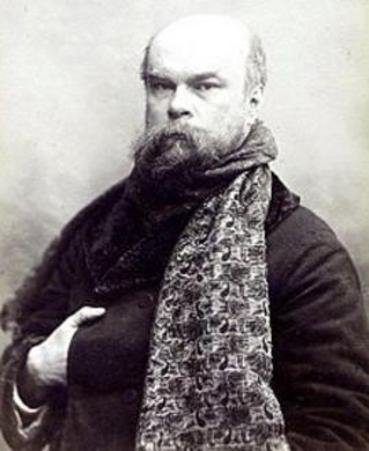
Paul Verlaine: poetry as an art of music
Among the writers who can be considered columns of the beginning of poetic modernity is the name of Paul Verlaine, preceded by Charles Baudelaire (to whom we dedicate three posts in this blog 1, 2 and 3), and accompanied by his contemporaries Arthur Rimbaud and Stéphane Mallarmé, to whom we will dedicate ourselves in due course. Marked by Romanticism, Verlaine participated in three movements or trends of great relevance in aesthetic modernity: Parnasianism, Symbolism and Decadentism, which we have already discussed.
As usual, we will give a biographical sketch of Verlaine, then move on to his literary work and his contributions and influences.

Paul Verlaine, a French poet and essayist, was born in Metz in 1844. He belonged to a petit bourgeoisie family. From a young age he was a regular at cafés and literary salons in Paris. He collaborated in the first issue of the magazine Contemporary Parnassus published in 1866, organ of the movement that would become known as Parnasianism, where his Saturnine poems appeared. Later, in 1869, he published Gallant Feasts. In 1870, he married Mathilde Mauté, with whom he maintained a relationship whose development was conflictive and ended in definitive separation.
Shortly after their marriage, a young and precocious provincial poet named Arthur Rimbaud wrote to Verlaine, who was already a well-known poet, to consult him about his new poems. Invited by Verlaine, Rimbaud moves in with them. Both initiate a friendship that leads to a loving relationship. All of this and Rimbaud's conduct caused moments of scandal in the social and literary milieu. Verlaine abandons his wife and embarks on a journey through London and Brussels with Rimbaud. During this trip, he wrote much of Songs without words.

Apparently caused by jealousy, Verlaine shot Rimbaud in the wrist in 1873. He was sentenced to two years' imprisonment in Brussels. His wife obtains the approval of his separation processed since 1871. While in prison, Verlaine converted to Catholicism and began to write a book that would be called Prisonily, but which was never published.
After his release from prison, he went to England and then to France, where he worked as a teacher. In 1883, he published the first part of the Cursed poets in a magazine. In 1884 he published Long ago and these days, composed mainly of poems prior to 1874. This book, together with Wisdom (1880), and Parallel (1888) will form part of a great anthology published later. In those years he also published other texts written in prose, such as The men of today, short biographies of contemporary writers that appeared in 1886; My hospitals, accounts of their stays in hospitals; My prisons, accounts of their life in prison; and The confessions, autobiographical notes. It is also important to note that it was he who published Rimbaud's Illuminations in 1886, thanks to which the poet became more widely known.
Although Verlaine's fame grows, in a state of misery and aged prematurely, he falls ill. In 1894 he was elected "Prince of Poets" and is granted a pension. He died at the age of 51 in Paris in 1896.
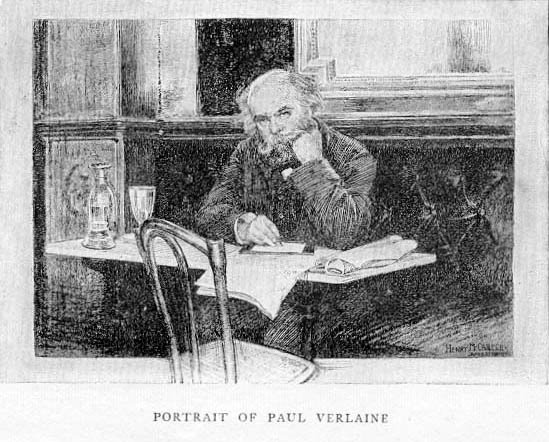
About the qualities of Verlaine's work and her contributions
*Let us begin with perhaps the most important of his features: the tendency of his poetry to become music. He knew how to make effective use of a set of resources - odd verses, alliterations, superimpositions, accentuations - that worked in favor of that musicality. But the musical mood of his poetry is given rather by the associations of special combinations of words that, containing sonorous inflections, sound like music. As Balakian points out: "They make music in the same way as the harmony of a series of musical sounds. And Verlaine seems to assume that their poetry is directed to the ear.
This aspect is expressed centrally in her first two books: Saturnine poems and Gallant Feasts. The first includes amorous and melancholic poems (supposedly inspired by his cousin Elisa, who married another and died in 1867). Its title was explained by Verlaine in an introductory poem in which he declares himself to be one of "those who were born under the sign of Saturn", "who have much misfortune and anger".
Although we know that the sound effects are hardly preserved in a translation (from French to English, in this case), we will cite one of the most representative of the aforementioned book to illustrate those exposed. It is "Autumn Song":
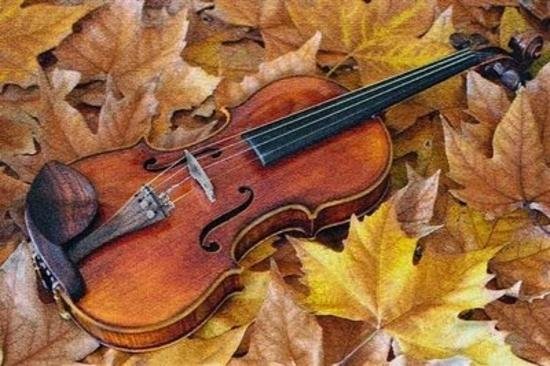
Leaf-strewing Wales
Utter low wails
Like violins,-
Till on my soul
Their creeping dole
Stealthily wins....
Days long gone by!
In such hour, I,
Choking and pale,
Call you to mind,-
Then like the wind
Weep I and wail.
And, as by wind
Harsh and unkind,
Driven by grief,
Go I, here, there,
Recking not where,
Like the dead leaf.
(Here I leave you a link with a recitation of the poem in French and Spanish to appreciate the musical effect.)
However, having included it in a later book (Parallel), his poem "Poetic art" is essential for us to know, as it condenses Verlaine's poetic vision. I will cite only his first three verses:
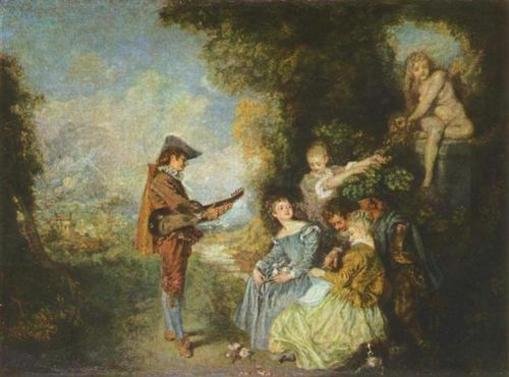
Music first and foremost! In your verse,
Choose those meters odd of syllable,
Supple in the air, vague, flexible,
Free of pounding beat, heavy or terse.
Choose the words you use-now right, now wrong-
With abandon: when the poet's vision
Couples the Precise with Imprecision,
Best the giddy shadows of his song:
Eyes veiled, hidden, dark with mystery,
Sunshine trembling in the noonday glare,
Starlight, in the tepid autumn air,
Shimmering in night-blue filigree!
(The full English version is available here, the original French version and the Spanish version)

*As we can see in the poem "Poetic Art", the feature indicated is intimately linked to another aspect: the force given to the suggestive value of verbal sonorities gives rise to a small universe of meaning in which the sonorous timbre and the meaning of the words converge. Verlaine avoided resounding and brilliant sounds and was inclined towards the tenuous and nuanced ones reached with the choice of words that gave those subtle emotions.
*This art of tonal and semantic suggestion (a fundamental contribution to Symbolism and modern poetry) is best expressed in his second book, Gallant Feasts, where the soul landscape is linked to the world made by man, which has led to talk of Verlaine's "impressionism", anticipating the pictorial and musical movement of a few years later.
In Gallant Feasts, Verlaine takes on the landscapes, characters and moral atmosphere, between festive, melancholic and ironic, of the plastic world created by Antoine Watteau (1684-1721), a French painter at the end of the Baroque.
In the indirect or intransitive sense that the suggestion seeks, the personal feeling is simulated in that atmosphere of dances, serenades, disguises, courtly encounters, with poems where emotions mix ingenuity, tenderness, irony, exquisiteness, debauchery, etc. Critics have pointed out that Verlaine discovers the suggestive force of half-light rather than full sunlight, that words that suggest emotion are more powerful than those that explicitly name them. This is another capital contribution of Verlaine.

Let's see the poem "Light of moon" from Gallant Feasts, an image so cultivated in impressionist and classical music:
Your soul is as a moonlit landscape fair,
Peopled with maskers delicate and dim,
That play on lutes and dance and have an air
Of being sad in their fantastic trim.
The while they celebrate in minor strain
Triumphant love, effective enterprise,
They have an air of knowing all is vain,-
And through the quiet moonlight their songs rise,
The melancholy moonlight, sweet and lone,
That makes to dream the birds upon the tree,
And in their polished basins of white stone
The fountains tall to sob with ecstasy.
(Here is a sung version of the poem with Spanish subtitles Fuente)
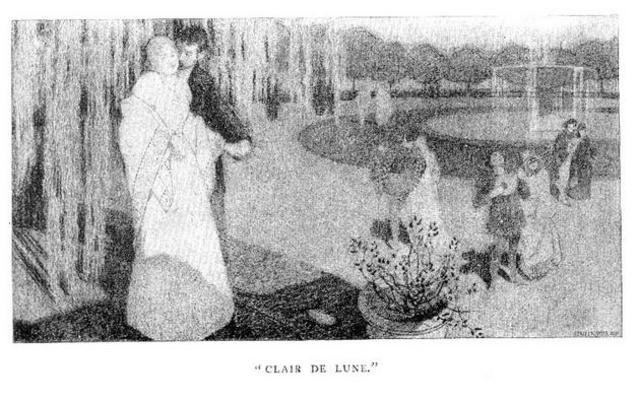
*In Songs without words, Verlaine maintained her inclination to musicality, but remarked something that we can already perceive in the previous book, which would be another of her contributions: the use of simple and common words. The poem III (without title, whose first verse is "Cry in my heart") of "Small forgotten arias" is very representative:
It is crying inside my heart
As it is raining over the town;
What is this lethargy
Entering my heart?
Oh sweet sound of the rain
On the ground and on the roofs!
To a bored heart,
Oh the warbling of the rain!
It is crying without any reason
Inside that heart that makes itself sick.
What! No betrayal?....
That mourning is unjustified.
Not knowing the reason why
Is the greatest sorrow
Without love or hatred
My heart deeply is in pain!
(See original in French and version in Spanish)
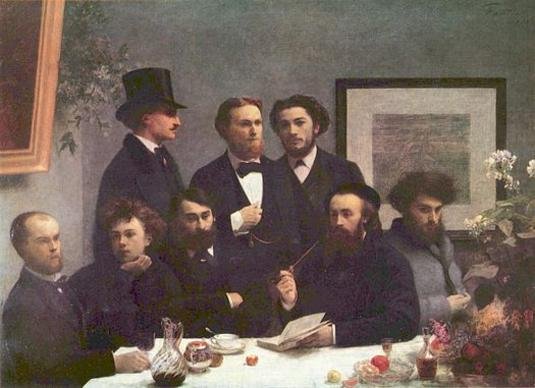
In his book, of great importance for modern poetry, Accured poets, a prose book in which he includes those he considered, with that adjective, poets who burst out both against poetic tradition and before social norms, becoming poets on the margins, included Rimbaud, Mallarmé, Corbiére, among others. As Friedrich points out, in that book Verlaine expresses: "The suffering of the misunderstood self in the face of the proscription of the world environment, caused by himself (...)". Of Rimbaud, his life companion, he says at the beginning:
It was with joy that we met Arthur Rimbaud. Today, many things separate us, without, of course, our deep admiration for his genius and character having ever lacked or diminished.
At that time, relatively distant from our intimacy, Arthur Rimbaud was a boy of sixteen or seventeen years of age, already by then secured to the entire poetic wealth, which the public would need to know, and of which we will rehearse an analysis while quoting as much as possible.
When Verlaine received the -false- news of Rimbaud's death, he wrote the poem "Laeti et errabundi" (in a free translation, it would be "Happy and wanderings"), in which he speaks of his journey with Rimbaud, of freedom and exalts the young poet. As it is quite extensive, we will only transcribe three stanzas:

We were going, -he remembers,
Traveller where it disappeared?
Light thread in the subtle air,
Two happy ghosts, you'd think!
(…)
I believe in the pride of being more free
Only the freest in the world,
Deaf to swearing of all kinds,
Inaccessible to filthy laughter.
(…)
What, the miraculous poem
And all-philosophy,
And my homeland and my bohemian
Dead? Dead? Come on, you're living my life!
To close this passage through the work of Verlaine, support of poetic modernity, let's quote two of his scholars:
What this poetry evokes without equal intensity is the music of daily joy or suffering, the feeling of life, of naked life, where thought is no more than the dream of blood that waters the flesh. (Marcel Raymond)
What seems to be forgotten is that Verlaine was a poet (...) who exerted a great influence on Western Europe (...), which has not ceased to be exerted (...) (Anna Balakian).
He also influenced America through the movement baptized as Modernism towards the end of the 19th century, with poets such as Rubén Darío.
Bibliographical References
Balakian, Anna (1969. The symbolist movement. Spain: Edit. Guadarrama.
Friedrich, Hugo (1974). Structure of modern lyrics. Spain: Edit. Seix Barral.
Raymond, Marcel (1983). From Baudelaire to surrealism. Spain: Fondo de Cultura Económica.
Todó, Lluís (1987). Symbolism. Spain: Edit. Montesinos.
Valerie, Paul (1993). Poetic Anthology. Spain: Libros Río Nuevo.
(If you are interested you can go to this link for a version of several poems by Verlaine in English, in French or in Spanish)
Written by @josemalavem
Click on the coin to join our Discord Chat

Witness proposal is here:
Go To Steem Witness Page
In the bottom of the page type: adsactly-witness and press vote.

Use small letters and no "@" sign. Or, click here to vote directly!
Thank you!
while it rains over the city, is perhaps one of the most beautiful and where it is easy to catch the image of the lyrical voice and its environment. Thank you for such an excellent post.When I hear or read about Verlaine, I can't help thinking about her relationship with Rimbaud or her contribution to modernism, and that's exactly what I found most salient in your post, @josemalavem. To read his poems is to find the musicality, rhythm and structure so emblematic of modernism. In his poem Ars poética we find the look and the conception that he had of poetry. The poem III, which says: Cry within my heart
Indeed, the highest value of Verlaine's poetry lies in its concept and practice of musicality. In the anecdotal, his relationship with Rimbaud. And its influence on Spanish-American and Anglo-Saxon Modernism is remarkable. Thanks for your comment, @nancybriti.
awesome.
Nice one! Good research! Carry on!
Posted using Partiko Android
Thank you for your assessment, @cyberdyn.